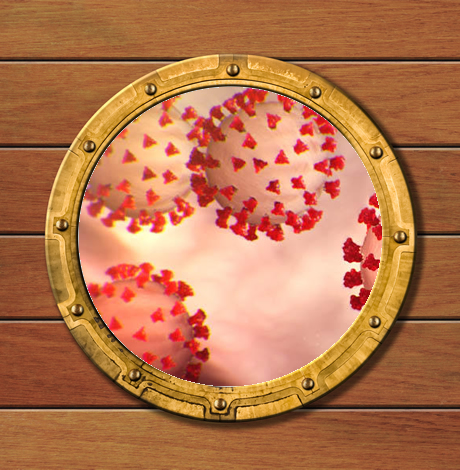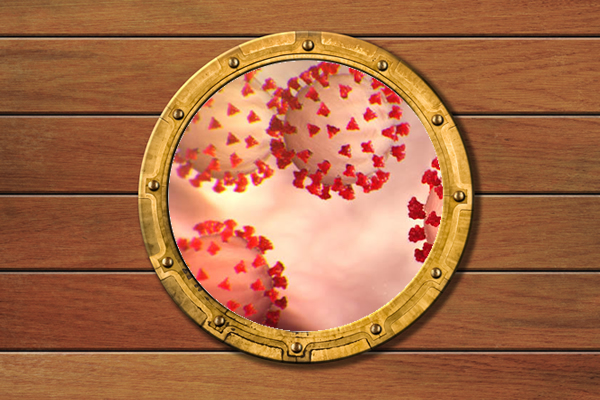Advice
ADVICE: Nerves easily fray while social distancing
Look within to avoid unnecessary tension with your significant other


For many years, I’ve told couples I work with that being in long-term relationships is like taking a long journey by ship in a very small stateroom. You know, the kind where the couch unfolds to be a bed, you have to step over your partner’s legs to get to the bathroom and there’s no place to stow the suitcases. You have to find a way to stay calm, not drive each other crazy and enjoy the voyage.
I’d never actually traveled by boat, so this was just my theory. So when my husband and I were lucky enough to take a journey by ship up the Norwegian coast a few years back and had a cabin exactly as I’d envisioned (i.e. teeny), I discovered I was right. Despite the unbelievably gorgeous scenery right out our porthole, after a few days we could see how easy it would be to get irritable with each other.
Now here we all are in a much more difficult situation. We’re stuck at home, on top of each other, trying to do our jobs while taking care of companion animals and children, attempting to avoid an invisible enemy that could be anywhere. We can’t go out on deck to watch Norway float by. Instead, we’ve got the television to look at, keeping us posted about all the bad and scary news.
So it’s natural that as our nerves fray, we’re going to get irritated by our mates. They’re in the way. We don’t like their tone. They aren’t doing enough or responding when we ask a question. We feel like we’re the one doing everything.
Sound familiar?
It makes sense that we react like this at such a stressful time, but when we do, it’s all downhill from there. In our current predicament, we don’t have the usual escape outlets that let us take a break and come back to our spouses calmer and with a refreshed attitude.
What to do? Here are some simple strategies to help you, your significant other and your relationship through this extraordinarily miserable period:
Don’t point fingers: Think about what you can do to make the situation better rather than focusing on what your spouse should be doing. And then do it. This is a great strategy even in normal times. Remember, we have very little power to get another person to do something, but lots of power over our own behavior. So if we want things to change, we should look first to ourselves.
Be generous: Does your spouse feel strongly about something? Now is likely not the time to get into a struggle over whose say goes. Unless you have good reason to go in the other direction, be generous. Again, this is a policy worth adhering to when we get back to normal (soon, I hope!).
Take responsibility for soothing your own anxiety: This is always a great idea, but especially now. Yes, when we’re worried about something it feels great to get a hug and be told everything will be OK. But right now, your partner is just as anxious as you are and likely without the bandwidth to soothe you. Moreover, none of us really know that everything will be OK.
So the best thing you can do when you’re anxious is look to yourself to find ways to keep as calm as you can, under the current circumstances: Meditation, slow deep breaths, whatever exercise you can find to do, striving to be in the present, working to accept uncertainty — these are all ways you may be able to help yourself feel even a little more calm.
And if you’re able to reach out and offer your spouse some loving reassurance — even if none of us know how this will end — so much the better. Giving your partner emotional support is always a good move.
Michael Radkowsky, Psy.D. is a licensed psychologist who works with LGBT couples and individuals in D.C. He can be found online at michaelradkowsky.com. All identifying information has been changed for reasons of confidentiality. Have a question? Send it to [email protected].

Hi Michael,
When I came to D.C. for college and came out, I was idealistic about finding true love. I made gay friends at school and watched them hooking up all the time.
It seemed like the opposite of what I wanted. I dreamed of meeting “Prince Charming” and living happily ever after. I thought I would put off sex until I met my special guy.
This went on for a while until I got too horny and impatient to keep putting off sex. The boyfriend wasn’t materializing so I went online and hooked up. Actually it was a lot of fun.
Soon I was hooking up as much as any of my friends were. I kept hoping I’d still find my prince. But over time most of my energy shifted to finding guys to have sex with.
Now I’m 34. I’ve been at this a long time and I realized the other day that I don’t like my life.
I haven’t been on a real date in years but I’m hooking up multiple times a week. I’ve been with almost everyone I see on the apps whom I find attractive (where the feeling was mutual). And yes, I’ve been with a lot whom I didn’t find attractive because I was horny.
I look at myself and I think, yuk. I don’t like whom I’ve become.
I feel like I am addicted to hooking up. I just keep craving something. The release but mostly the attention, that the other person finds me hot. After I come, I feel like the whole thing was pointless, and a little disgusted with myself. Advice?
Michael replies:
You’re using hookups not just for sex, but as a way to feel good about yourself by getting positive attention from others.
But other-validation is like junk food, a sugary snack that staves off hunger for a few minutes and never really fills you up. All those guys you hook up with? The attention feels great, but as you wrote, that feeling lasts until your orgasm. And then you’re back to chasing it.
As with junk food, the other-validation you get when you hook up is a lot of empty calories. Having someone you don’t even know agree to have sex with you says nothing meaningful about your worth or even your attractiveness.
Yet another problem: If you believe that you need other-validation, you will do all sorts of self-damaging behaviors to get it—such as hookups that leave you feeling empty and disgusted. I’ve seen many people lose their self-respect in the service of getting other people’s positive attention through behaviors that violate their own integrity. Doing things that make you feel bad about yourself in an attempt to feel good about yourself is ironic, and sad.
The bottom line is that other people can’t “make” you feel good about yourself. They might give you a small temporary boost, but your self-esteem actually has to come from you. That’s why it’s called self-esteem. Once you are past a certain age, if you don’t believe that you have value, no one else can get you there. You have to validate yourself.
Let’s go big-picture for a moment: It is our parents’ job to teach us that we have value when we are little, and when that doesn’t happen, we often struggle with self-esteem throughout our lives, unless we can find a path to develop our own belief in our worth. In the meantime, we may chase other-validation in a futile attempt to fill ourselves up.
Other experiences we go through—for example, growing up gay in a hostile environment—can also do a number on how we see ourselves, and leave us grasping for affirmation from others. It takes work to get through and get past the impact of these experiences.
So how do you get better at giving yourself the validation you are seeking? There’s a great saying from the 12-step programs: If you want to have self-esteem, behave in esteemable ways.
What would it mean for you to behave in a way that you respect? Your letter provides one answer that is true for you: Stop engaging in sexual encounters that leave you disliking yourself.
Far easier said than done, right? But that doesn’t mean it’s impossible. Having gotten clarity that you don’t like the life you’ve constructed for yourself, now you actually can do something about it. Keep in mind, though, that you will face some challenges if you stop hooking up.
First: You may find it isolating and scary to stop doing something that all or most of your friends are doing. You will have to reassure yourself that you’re doing what’s right for you; that you are taking good care of yourself by choosing to avoid behaviors that leave you feeling bad; and that it’s OK to be different from “everyone else.” In other words, you are going to have to get much better at self-validation.
If you have some friends who don’t spend a lot of their time hooking up, they may be good supports for you. Some guys find camaraderie from attending a 12-step program like Sexual Compulsives Anonymous (SCA).
Second: People often use hookups (and sex) not just for sexual gratification, but to soothe anxiety, stress, depression, and other uncomfortable feelings. If you stop hooking up, you will likely need some other ways to keep yourself calm and to steady your mood. Exercise and meditation are two obvious means.
You’d be wise to figure out new ways to fill your time that give you a sense of meaning and connection. I can’t tell you what those might be; only you can figure out what is right for you. They might include developing or deepening warm friendships, taking good care of yourself, finding a new activity that interests you — the list can go on and on.
If you still want to find your prince, this is the way to go about it. The cliché is true: You can’t expect anyone to like you unless you like yourself. If you build a life rich in fulfilling pursuits that help you to feel good about who you are and the life you are leading, you will be transforming yourself into relationship material.
Keep in mind, though, that letting yourself get close to someone through a heart connection would mean having to confront all sorts of uncomfortable emotions, including feeling vulnerable, that you have avoided by limiting yourself to crotch attachments.
That said, working to become a more solid person would help you develop the strength to tolerate the ongoing challenges of a close relationship.
Michael Radkowsky, Psy.D. is a licensed psychologist who works with couples and individuals in D.C. He can be found online at michaelradkowsky.com. All identifying information has been changed for reasons of confidentiality. Have a question? Send it to [email protected].

Hi Michael,
I’m in a relationship I think I don’t want to be in.
Ed is very sweet and that’s part of the problem. He is always solicitous of me, caring, kind, agreeable. I don’t want to hurt his feelings, which I certainly would do if I dump him.
We’ve gotten into what is now a serious relationship because of him, not me. He kept asking me out on one date after another, and I kept saying yes. He proposed being exclusive, and I said yes.
I was lonely, Ed’s cute and a nice guy, and it felt good to be cared about.
Ed is great at planning a fun life. Dinners, vacations, socializing. My life is way more exciting than it used to be. Ed takes the initiative on everything and he’s very good at it.
But I feel smothered, like I don’t have a say in how I live and what I do. We spend all our time together. And my friends are now “our” friends because he always joins me when I get together with them.
I can’t talk about this with him because I don’t think he can handle it. If he sees the least sign of me being upset, he says, “What’s wrong? Are you mad at me?” with this vulnerable tone in his voice. He’s told me he’s afraid of losing me when I’ve shown any unhappiness.
I’m no longer attracted to him. I don’t know why, he’s as cute as ever.
Sometimes I wonder what’s wrong with me. I have a good-looking, caring boyfriend. So many guys want this. I should be happy. But I’m not.
On the other hand, I’m afraid that if I break up with Ed I will be lonely all over again and maybe never find such a caring person.
Any guidance you have would be appreciated in how to think about this and sort it out.
Michael replies:
This relationship is giving you all sorts of opportunities to become a more solid person.
First point to consider: If you can’t set boundaries, you will spend your life twisting yourself into a pretzel to accommodate others. That’s what is happening now with Ed.
When we are struggling to succeed at an important life skill, as you are here, it’s helpful to think how our personal history may be contributing to our being stuck.
Some possibilities for you to consider: What example did your parents model? Perhaps they had trouble setting boundaries in their relationships, so you didn’t learn how to do so. Or perhaps when you were growing up, you didn’t have much say about what you could or couldn’t do, so you didn’t learn you could speak up about what is important to you.
I’m painting with a broad brush here, just to inspire your own thinking. While our lives aren’t rigidly determined by our pasts, the ways that we learned to relate as we grew up do have a powerful influence on how we live in the present. Having some sense of what has shaped our operating system can help us loosen up and try new ways of behaving.
Second (and related) point: You cannot go through life without ever disappointing anyone or you will (as noted above) start to resemble a pretzel. Yes, you’ll likely upset Ed when you tell him that you’re unhappy in the relationship. But if Ed is going to address his clingy and needy behavior, he needs to hear this.
At their best, relationships challenge us to grow. This relationship is pushing you to tolerate disappointing someone you care about, in the service of saying what you need to say. And guess what? Your letting Ed know where you stand will challenge him to work on his own relational wobbliness. Very cool.
Third point: Why are you not stepping forward with your own ideas about what you want to do and how you want to live? You are letting Ed do all the work. What is up with that?
One obvious explanation: Your difficulty setting a boundary is stopping you from asserting what you want. In other words, your inability to say “no” is leading you to feel stifled in this relationship. Good news: you have the power to change this.
Another possibility: Maybe you don’t actually have much in the way of interests or ideas for what you would like to do, and Ed is merely filling the void so that the two of you have some kind of life together.
If so, I encourage you to start thinking about what is meaningful to you. Developing a self—figuring out what is important to you, what you care about—is one of the great tasks and great joys of being alive. If you just keep doing what others around you want—boyfriends, friends, family—you may keep feeling resentful and will squander your life.
I don’t know if you would actually enjoy being with Ed if you do the work to become a solid person who speaks up about what is important and brings his own agenda to the relationship. While it’s your decision to do so or not, I urge you not to decide based on fear of stepping outside your comfort zone.
And please consider that this work would help you in any future relationship, if you end things with Ed.
One more point: It’s no surprise that you’ve lost interest in having sex with Ed. Being enmeshed with someone as tightly as you describe your fusion with Ed is a desire-killer. Perhaps this would change if you give yourself some room to breathe.
Michael Radkowsky, Psy.D. is a licensed psychologist who works with couples and individuals in D.C. He can be found online at michaelradkowsky.com. All identifying information has been changed for reasons of confidentiality. Have a question? Send it to [email protected].
Advice
Navigating these uncertain times
You have no power over others, but you have a lot of power over yourself

For Valentine’s Day, I was planning to write a column about shifts we can make in our attitudes and behaviors to strengthen our love relationships and deepen our connection with our partners.
Then, over the past few weeks, as I’ve been listening to many of my clients express their concerns about the state of our country and our world, I realized that much of what is required to have a great relationship can also help us get through the difficult times we live in.
So here are some principles that I hope will help you to navigate both the challenges of being in a close relationship and the challenges of uncertain times.
These principles overlap because they are all components of an approach to living that focuses on developing and maintaining agency over your life, and working to strengthen your resilience. The more solid you are, the better you can get through the hard stuff.
Strive to behave with integrity, in a way that you respect. You are likely to feel a lot better about yourself if you do what you believe is right, rather than betraying your values out of fear or to please others. The playwright Lillian Hellman, pressed to appear before the House Committee on Un-American Activities in 1952 and “name names,” said it well: “I cannot and will not cut my conscience to suit this year’s fashions.” (Of course, only you can decide how to balance possible consequences with the importance of honoring your principles.)
Stand up for what you believe in. Being quiet out of fear or concern for what others will think leaves us feeling like helpless victims. And you cannot have an intimate relationship when you don’t let your partner know important parts of who you are.
Strive to be non-reactive. Do your best to not let others (or circumstances) press your buttons so that you lash out, rather than responding thoughtfully and with deliberation, based on your values.
Strive to always soothe your anxiety. The philosopher Viktor Frankl wrote: “Between stimulus and response there is a space. In that space is our power to choose our response. In our response lies our growth and our freedom.” When someone or something is starting to make us crazy, the best first move we can make is to quiet ourselves. Doing so allows us to think how to best respond.
There’s a great saying from Twelve Step programs: “If you want to have self-esteem, behave in esteemable ways.” You are more likely to do so when you first calm yourself, rather than exploding with anxiety or rage.
Strive to tolerate discomfort: Sometimes we can’t do much about what is making us uncomfortable or causing us distress. Our partner may not change in ways we would like; our job situation may be rough; we may face hostility in the outside world. Identifying how we can deal with challenges and difficult circumstances in a way that helps us become stronger and more resilient can often help us to weather them a bit more easily.
Strive to tolerate uncertainty: There really are no guarantees about anything important in life. That’s the way it goes. We can’t know how things will turn out —neither our relationships nor our lives nor the fate of humanity. So if we are to construct a meaningful life, we have no choice other than to keep putting one foot in front of the other, doing our best to respond thoughtfully and to have an impact when and where we can, without knowing the outcome.
Strive to stay anchored in reality, not lost in feelings. When we let our feelings run the show, it’s easy to get spun up and reactive. While our feelings are a source of information, they are not reality. All sorts of things—our pasts, the distortions of social media, what people around us are doing and saying—can contribute to how we feel about a situation.
Yes, it’s always a good idea to be aware of our feelings. But before acting on them, calm yourself, get some clarity about why you may be feeling what you’re feeling, and think about how reality lines up (or doesn’t line up) with what you’re feeling. In other words, aim to keep the big picture in mind.
Remember that you cannot change others, but you may at times be able to influence them. For example, when I first became vegetarian, I wanted to push my friends to adopt a vegetarian diet by “enlightening” them about the misery of factory farms and the environmental cost of raising animals for food. I soon realized that lectures and judgment are not a great way to change minds. Serving delicious vegetarian food for a dinner is more helpful. So think about how you can reach out to someone or to others with different views, in a way that they are more likely to hear you.
Obviously, there are limits to this approach. There may be times when you aren’t going to be heard, no matter how you say what you have to say. The point at which we shift from reaching out to someone to taking a “don’t tread on me” stance can be tricky to discern, and the decision to make that shift should be taken thoughtfully and with appreciation of possible consequences.
Keep your focus mainly on what you can do about a situation. Focus less on what the other person is doing wrong, or not doing. While you have little or no power over others, you have a lot of power over yourself. Thinking about what you can do to effect at least some of the change you would like, in your relationship or your community or our world, is an antidote to feeling powerless.
Michael Radkowsky, Psy.D. is a licensed psychologist who works with couples and individuals in D.C. He can be found online at michaelradkowsky.com. All identifying information has been changed for reasons of confidentiality. Have a question? Send it to [email protected].)
-

 State Department5 days ago
State Department5 days agoHIV/AIDS activists protest at State Department, demand full PEPFAR funding restoration
-

 Brazil5 days ago
Brazil5 days agoUS lists transgender Brazilian congresswoman’s gender as ‘male’ on visa
-

 District of Columbia5 days ago
District of Columbia5 days agoCapital Pride wins $900,000 D.C. grant to support WorldPride
-

 Obituary4 days ago
Obituary4 days agoLocal attorney, LGBTQ rights advocate Dale Sanders dies at 75












